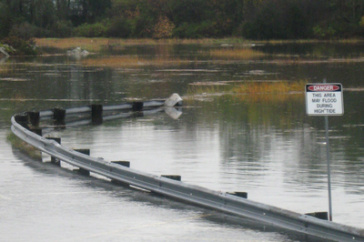'Understanding' of Climate Change Depends on Politics, New Carsey Institute Research Shows

Photo of inundated road by Roger Stephenson courtesy of Piscataqua Region Estuaries Partnership's "2011 King Tide Photo Contest."
DURHAM, N.H. - Most Americans say they understand climate change issues and believe climate change is happening now, but their understanding and perceptions of science are influenced by political views, according to new research from the Carsey Institute at the University of New Hampshire.
"Most people report understanding a moderate amount or a great deal about climate change, but what they mean by 'understanding' varies with their political beliefs, which lead them to opposite perceptions about science," said Lawrence Hamilton, professor of sociology at UNH and a senior fellow at the Carsey Institute. "They often derive their information and sense of understanding from sources chosen to align with their politics. Democrats are more inclined to trust scientists as a source of information on environmental issues. Only a minority of Republicans say they trust scientists."
The research is based on the National Community and Environment in Rural America (NCERA) survey, and on New Hampshire's statewide Granite State Poll. The UNH Survey Center conducts both surveys. For the national survey, interviews with 2,006 people across all 50 states were carried out in August 2011. The Granite State Poll, which has been tracking opinions of New Hampshire residents since 2001, surveys representative samples of about 500 state residents four times each year. Since 2010, both NCERA and the Granite State Polls have included a set of climate questions designed around statements by scientist.
"A central point common to statements by major scientific organizations—such as the American Association for the Advancement of Science, the American Geophysical Union, and members of the National Academy of Sciences—is that climate change is currently happening, caused mainly by human activities. Our surveys clearly show that most Democrats believe this point, whereas most Republicans do not," Hamilton said.
Democrats are also more likely to think most scientists agree that climate is changing now due to human activities. Republicans tend to think there is little agreement among scientists on this point.
New Hampshire Trends
Responses from New Hampshire residents broadly resemble those on the national survey. In New Hampshire as in the nation, about 90 percent believe the climate is changing, more than half believe that human activities are the cause, and more than half think that most scientists agree. Repeated New Hampshire surveys add a time dimension: seven polls over the past two years, involving more than 3,600 interviews, show persistent polarization but no indication that belief in human-caused change is declining — contrary to some other reports.
Deep partisan divisions appear on both surveys, but they are deeper in New Hampshire, where people also feel better informed, according to Hamilton. "Both differences are consistent with the state's relatively high levels of education and political awareness fueled by its first-in-the-nation presidential primary."
The complete Carsey Institute report about this research is available at http://carseyinstitute.unh.edu/CarseySearch/search.php?id=180. Hamilton will present results from these and other surveys at meetings of the American Geophysical Union in San Francisco this week.
The study has been supported by grants from the Ford Foundation, the Neil and Louise Tillotson Fund, the Office of Rural Development in the U.S. Department of Agriculture, and at the University of New Hampshire by the UNH Sustainability Academy and the Carsey Institute.
The Carsey Institute conducts policy research on vulnerable children, youth, and families and on sustainable community development. The institute gives policy makers and practitioners the timely, independent resources they need to effect change in their communities. For more information about the Carsey Institute, go to www.carseyinstitute.unh.edu.
The University of New Hampshire, founded in 1866, is a world-class public research university with the feel of a New England liberal arts college. A land, sea, and space-grant university, UNH is the state's flagship public institution, enrolling 12,200 undergraduate and 2,300 graduate students.
GRAPHICS
Understanding about global warming or climate change issues
/unhtoday/sites/default/files/newsroom/img/carsey/climatechange1.tif
Personal beliefs about cause of climate change
/unhtoday/sites/default/files/newsroom/img/carsey/climatechange2.tif
Personal belief about cause of climate change, by political party
/unhtoday/sites/default/files/newsroom/img/carsey/climatechange3.tif
Level of trust in scientists as a source of information about environmental issues, by political party
/unhtoday/sites/default/files/newsroom/img/carsey/climatechange7.tif
-30-
-
Media Contact
Lawrence Hamilton | Carsey Institute at UNH | lawrence.hamilton@unh.edu | 603-862-1859
Latest News
-
July 2, 2024
-
June 18, 2024
-
June 18, 2024
-
May 17, 2024
-
May 14, 2024

















































